The Glass Prepreg Market is estimated at USD 6.3 billion in 2025 and is forecast to reach USD 12.9 billion by 2035, representing a CAGR of 7.4%. Examining the market maturity curve and adoption lifecycle reveals a structured progression from early adoption to scaling and eventual consolidation over the forecast period. During the early adoption phase, leading up to 2025, demand growth is primarily concentrated among aerospace, automotive, and high-performance industrial applications.
Market expansion in this phase is driven by early movers leveraging superior mechanical and thermal properties of glass prepreg, alongside the introduction of specialized composite formulations. The scaling phase, spanning 2025 to 2030, reflects accelerated adoption across additional industrial segments, including wind energy, marine, and construction applications. The annual growth increments from USD 6.3 billion in 2025 to USD 9.0 billion in 2030 illustrate a steady ramp-up, indicating increasing acceptance of glass prepreg as a preferred composite material.
From 2030 to 2035, the market enters a consolidation phase, characterized by broader penetration, standardization of production processes, and incremental improvements in material performance. Growth from USD 9.7 billion in 2030 to USD 12.9 billion in 2035 demonstrates continued adoption, albeit at a relatively moderated pace as the market matures. Segment-wise, aerospace and automotive maintain leadership in the adoption lifecycle, while emerging segments such as renewable energy and specialty industrial applications contribute significantly to scaling.
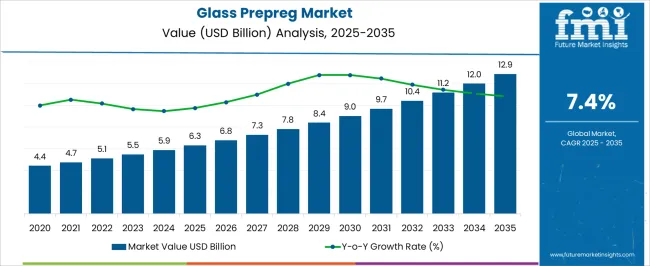
| Metric | Value |
|---|---|
| Glass Prepreg Market Estimated Value in (2025 E) | USD 6.3 billion |
| Glass Prepreg Market Forecast Value in (2035 F) | USD 12.9 billion |
| Forecast CAGR (2025 to 2035) | 7.4% |
The glass prepreg market is expanding steadily due to increasing demand for lightweight and high-strength composite materials across multiple industries. Innovations in thermosetting resins have improved material performance, offering enhanced durability and resistance to heat and chemicals. These improvements have made glass prepregs a preferred choice for applications that require superior mechanical properties and long-term reliability.
The aerospace and defense sectors are significant drivers of demand, seeking materials that reduce weight while maintaining structural integrity to improve fuel efficiency and performance. Rising investments in aircraft manufacturing and defense modernization programs have further boosted the market.
Additionally, the growing adoption of composite materials in automotive, wind energy, and construction industries presents future growth opportunities. Focus on sustainability and regulatory requirements for reduced emissions have also encouraged the use of advanced composites like glass prepregs. Segment growth is anticipated to be led by thermosetting products, E-glass fiber types, and aerospace and defense applications.
The glass prepreg market is segmented by product, fiber type, application, and region. By product, the market is divided into thermosetting, epoxy resin, phenolic resin, and polyester resin. In terms of fiber type, the market is classified into E-glass prepreg, S-glass prepreg, and other glass fiber types. Based on application, the market is segmented into aerospace and defense, automotive, wind energy, electronics, construction, sporting goods, and others. Regionally, the glass prepreg industry is categorized into North America, Latin America, Western Europe, Eastern Europe, Balkan & Baltic Countries, Russia & Belarus, Central Asia, East Asia, South Asia & Pacific, and the Middle East & Africa.
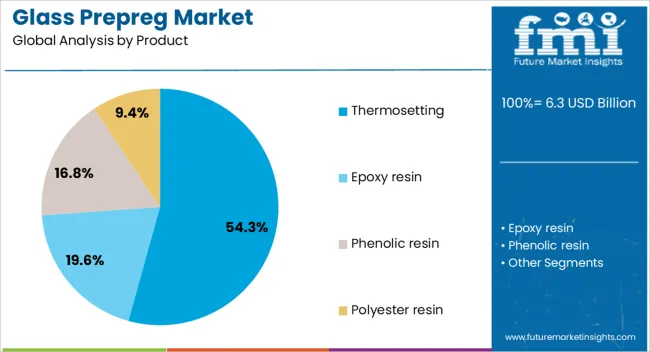
The thermosetting product segment is projected to hold 54.3% of the glass prepreg market revenue in 2025, maintaining its leadership position. Thermosetting resins are preferred due to their excellent thermal stability and mechanical strength once cured, which makes them suitable for high-performance applications.
These resins offer superior resistance to environmental degradation, making the final composite materials reliable over extended periods. Manufacturers and end users have favored thermosetting glass prepregs in demanding sectors where safety and durability are critical.
The curing process of thermosetting materials also allows for precise control over material properties, enabling tailored solutions for specific structural requirements. As industries continue to pursue weight reduction without compromising strength, the thermosetting segment is expected to remain dominant.
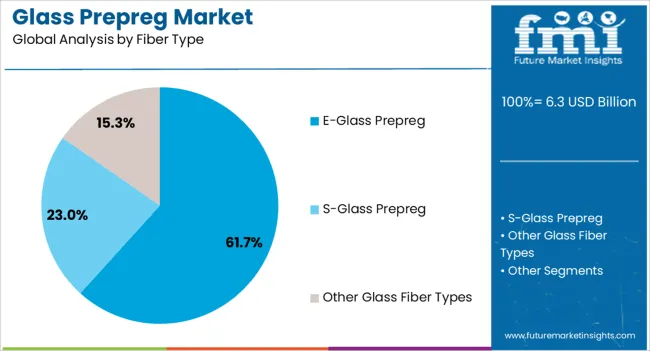
The E-glass prepreg segment is projected to contribute 61.7% of the glass prepreg market revenue in 2025, securing its position as the leading fiber type. E-glass is favored for its balanced combination of strength, cost-effectiveness, and electrical insulation properties.
This fiber type has found extensive use in aerospace and defense due to its reliable performance under stress and ability to withstand harsh operational environments. Its wide availability and well-established manufacturing processes also contribute to its market dominance.
The versatility of E-glass prepregs across applications ranging from structural components to insulation has sustained its demand. As manufacturing techniques advance and cost pressures remain relevant, the E-glass segment is expected to sustain its leadership in the market.
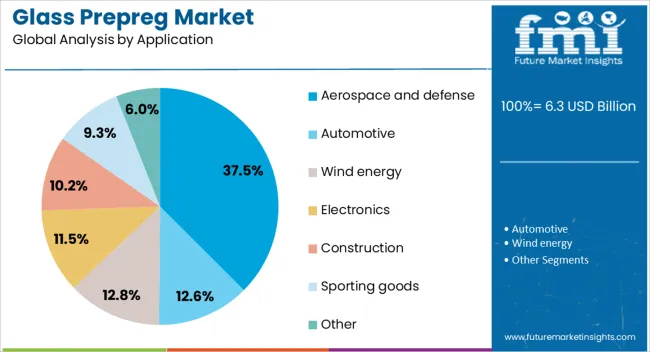
The aerospace and defense application segment is projected to account for 37.5% of the glass prepreg market revenue in 2025, reflecting its importance as a key end-use industry. The sector requires materials that offer high strength-to-weight ratios and excellent fatigue resistance to meet stringent safety and performance standards.
Glass prepregs have been increasingly adopted in aircraft components, protective equipment, and defense infrastructure for their durability and weight savings. Investments in new aircraft programs and upgrades to existing fleets have driven demand for advanced composite materials.
Additionally, defense agencies have emphasized the use of lightweight composites to enhance mobility and operational efficiency. With ongoing focus on performance optimization and regulatory compliance, the aerospace and defense segment is expected to remain a primary driver of glass prepreg market growth.
The market has been expanding due to increasing demand for advanced composite materials in aerospace, automotive, wind energy, and industrial applications. Glass prepregs, consisting of woven glass fibers impregnated with resin systems, have been widely adopted for lightweight, high-strength, and durable components. Market growth has been supported by advances in epoxy, phenolic, and thermoplastic resin formulations, as well as improvements in curing processes and automation. Rising need for structural efficiency, fuel economy, and long-lasting performance has further strengthened the adoption of glass prepreg materials globally.
The adoption of glass prepregs in aerospace and automotive industries has been a primary driver of market growth. Aircraft interiors, structural panels, and lightweight components increasingly rely on glass prepregs to reduce weight while maintaining strength and fire resistance. In automotive manufacturing, prepregs are used in body panels, bumpers, and interior components to enhance fuel efficiency, reduce emissions, and improve durability. Automated lay-up, curing, and molding processes have enabled consistent quality and reduced production time. Additionally, the demand for hybrid composite structures combining glass prepregs with carbon fibers has expanded in performance-oriented vehicles. These factors have reinforced the role of glass prepregs as essential materials in sectors requiring lightweight, high-performance, and durable structural solutions.
Technological innovations in resin chemistry, fiber treatments, and curing processes have strengthened the glass prepreg market. Epoxy, phenolic, and thermoplastic resins have been optimized for improved adhesion, thermal stability, and moisture resistance. Advanced fiber sizing and surface treatments have enhanced interlaminar strength and impact resistance. Automation in tape laying, vacuum-assisted molding, and out-of-autoclave curing has improved production efficiency and repeatability. Research into hybrid composites, flame-retardant formulations, and recyclable prepregs has expanded applications in aerospace, automotive, and wind energy. These advancements have increased structural performance, durability, and processing efficiency, enabling broader adoption of glass prepregs in high-performance and safety-critical applications across multiple industries globally.
Industrial and wind energy sectors have significantly contributed to the growth of the glass prepreg market. Prepreg materials are used in manufacturing wind turbine blades, pressure vessels, and industrial machinery components where high strength-to-weight ratios, fatigue resistance, and dimensional stability are critical. Wind energy applications, in particular, require long, lightweight, and durable composite structures capable of withstanding environmental stress and cyclic loads. Manufacturing automation, advanced resin formulations, and precision lay-up techniques have allowed reliable production at scale. Industrial sectors also utilize glass prepregs for protective panels, insulating components, and chemical-resistant structures. These applications highlight the versatility and performance advantages of glass prepregs, reinforcing their adoption in sectors demanding efficiency, durability, and structural integrity.
Emerging markets and the growing demand for sustainable composites have created significant opportunities for the glass prepreg market. Expanding aerospace, automotive, and renewable energy industries in Asia-Pacific, Latin America, and the Middle East have increased consumption of prepreg materials for lightweight, high-strength structures. Research into recyclable resins, bio-based fibers, and hybrid composite solutions has opened avenues for environmentally friendly materials. The integration of glass prepregs into mass-produced automotive components and modular industrial structures offers cost-effective solutions. As the focus on fuel efficiency, structural durability, and sustainability intensifies globally, glass prepreg adoption is expected to expand across multiple sectors, presenting long-term growth potential and innovation opportunities.
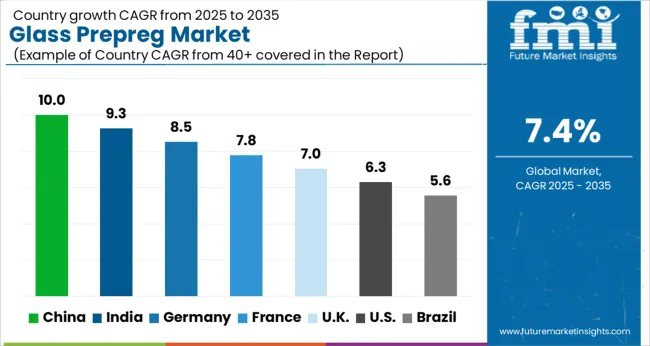
The market is expected to grow at a CAGR of 7.4% from 2025 to 2035, driven by increased use in aerospace, automotive, and renewable energy sectors due to its lightweight and high-strength properties. China leads with a 10.0% CAGR, propelled by large-scale manufacturing and growing demand in wind energy and transportation applications. India follows at 9.3%, supported by expanding industrial composites production and adoption in infrastructure projects. Germany, at 8.5%, benefits from advanced aerospace and automotive manufacturing capabilities. The UK, growing at 7.0%, focuses on high-performance composite applications, while the USA, at 6.3%, sees steady demand from aerospace and sports equipment sectors. This report includes insights on 40+ countries; the top markets are shown here for reference.
Sales of glass prepreg in China are projected to expand at a CAGR of 10% from 2025 to 2035, fueled by increasing adoption in wind energy blades, aerospace components, and automotive lightweight structures. Investments in high-performance prepreg materials and automated production facilities are enhancing manufacturing efficiency. Research in high-strength resin matrices and reinforcement fibers is improving mechanical and thermal properties. Domestic manufacturers are collaborating with international technology providers to optimize production and expand application areas. The growing demand for lightweight, durable materials in industrial and commercial applications is supporting sustained market growth.
The Indian glass prepreg industry is expected to grow at a CAGR of 9.3% during 2025 to 2035, supported by expanding aerospace, automotive, and renewable energy sectors. High-performance prepreg materials are increasingly adopted for lightweight structural components and composite laminates. Investments in automated fabrication and quality control technologies are enhancing product reliability. Collaborations with international material technology firms are accelerating knowledge transfer and advanced product development. Growing industrial emphasis on lightweight and durable composites is further supporting market expansion.
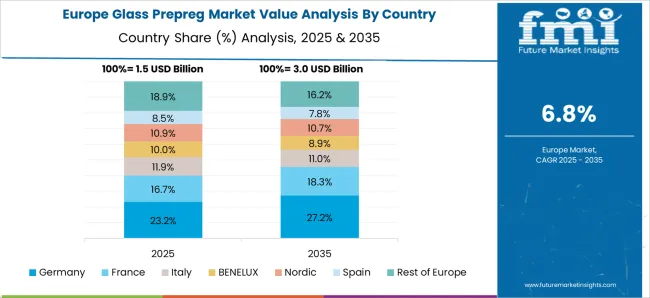
Germany is forecast to witness an 8.5% CAGR in the glass prepreg market from 2025 to 2035, driven by automotive, aerospace, and industrial equipment applications. The industry benefits from advanced polymer research and strong quality control standards. Adoption of high-strength resin systems and glass fiber reinforcements is rising to meet lightweight and durable material requirements. Industrial partnerships between manufacturers and research institutes are enhancing innovation. Government incentives for advanced composites in wind energy and transport sectors are also supporting market growth.
Glass prepreg demand in the United Kingdom is projected to expand at a CAGR of 7% during 2025 to 2035, driven by aerospace, transportation, and industrial applications. Investments in high-performance prepreg materials and manufacturing automation are enhancing efficiency and product quality. The adoption of composite laminates for lightweight structures is increasing. Collaborative initiatives between manufacturers and technology providers are supporting development of new resin systems and reinforcement fibers. Rising industrial emphasis on reducing weight while maintaining strength is fostering market growth.
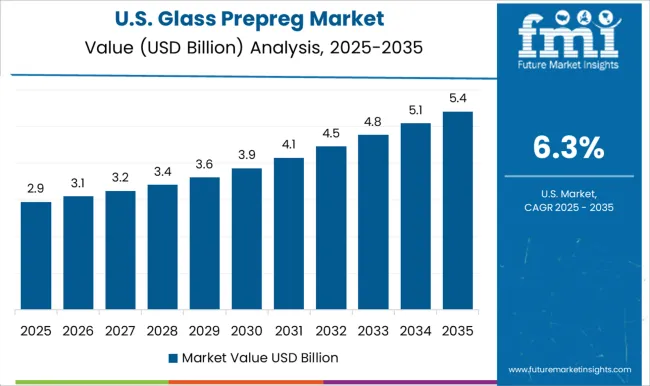
The United States market is forecast to grow at a CAGR of 6.3% from 2025 to 2035, supported by automotive, aerospace, and renewable energy sectors. Adoption of high-performance resins and glass fiber reinforcements is increasing for lightweight and durable components. Investments in automated production lines and quality assurance technologies are enhancing efficiency. Collaborative efforts between domestic manufacturers and international technology firms are accelerating product development. Industrial focus on advanced composites for energy and transport applications is driving sustained market growth.
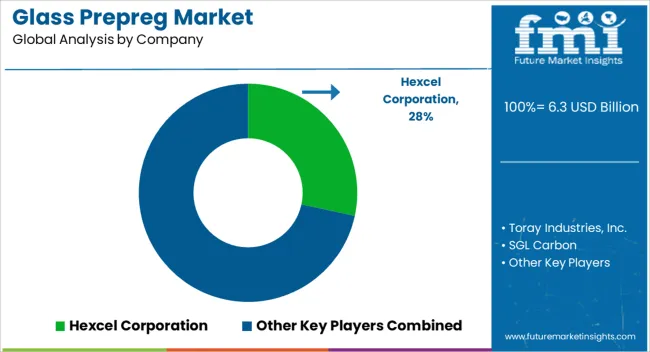
The market is defined by composite materials reinforced with glass fibers pre-impregnated with resin, widely applied in aerospace, automotive, wind energy, and construction industries. Key players focus on producing high-strength, lightweight, and heat-resistant prepregs that improve structural performance and durability.
Hexcel Corporation offers advanced glass prepreg solutions with tailored resin systems for aerospace and industrial applications, while Toray Industries, Inc. provides a broad portfolio of high-performance prepregs designed for demanding engineering requirements. SGL Carbon and Teijin Limited deliver specialty prepregs optimized for mechanical strength, thermal stability, and chemical resistance, serving sectors such as automotive and defense.
Gurit and Cytec Solvay Group focus on resin formulations and fiber combinations that enhance manufacturing efficiency and end-product performance. Owens Corning supplies prepregs with consistent quality, targeting both industrial and renewable energy applications, including wind turbine blades. Market competition is driven by material performance, manufacturing reliability, and the ability to meet stringent industry standards. Emerging companies emphasize R&D, product customization, and collaborations with OEMs to expand application scope. Entry barriers are substantial due to high capital requirements, technical expertise in fiber-resin systems, and the need for certifications for safety-critical applications.
| Item | Value |
|---|---|
| Quantitative Units | USD 6.3 Billion |
| Product | Thermosetting, Epoxy resin, Phenolic resin, and Polyester resin |
| Fiber Type | E-Glass Prepreg, S-Glass Prepreg, and Other Glass Fiber Types |
| Application | Aerospace and defense, Automotive, Wind energy, Electronics, Construction, Sporting goods, and Other |
| Regions Covered | North America, Europe, Asia-Pacific, Latin America, Middle East & Africa |
| Country Covered | United States, Canada, Germany, France, United Kingdom, China, Japan, India, Brazil, South Africa |
| Key Companies Profiled | Hexcel Corporation, Toray Industries, Inc., SGL Carbon SE, Teijin Limited, Gurit Holding AG, Solvay S.A., Owens Corning |
| Additional Attributes | Dollar sales by prepreg type and end-use industry, demand dynamics across aerospace, automotive, wind energy, and electronics sectors, regional trends in adoption across North America, Europe, and Asia-Pacific, innovation in resin systems, fiber alignment technologies, and high-temperature performance, environmental impact of composite manufacturing, energy consumption, and end-of-life recyclability, and emerging use cases in lightweight structural components, electric vehicle parts, and high-performance wind turbine blades. |
The global glass prepreg market is estimated to be valued at USD 6.3 billion in 2025.
The market size for the glass prepreg market is projected to reach USD 12.9 billion by 2035.
The glass prepreg market is expected to grow at a 7.4% CAGR between 2025 and 2035.
The key product types in glass prepreg market are thermosetting, epoxy resin, phenolic resin and polyester resin.
In terms of fiber type, e-glass prepreg segment to command 61.7% share in the glass prepreg market in 2025.
Explore Similar Insights

Thank you!
You will receive an email from our Business Development Manager. Please be sure to check your SPAM/JUNK folder too.
Chat With
MaRIA